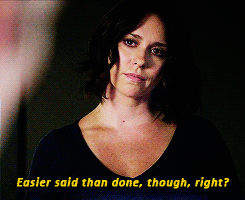“I don’t say a Zionist must be insane, but it helps if he is.” Chaim Weizmann
When the outgoing president of Israel said the above in 1952, the country was only three years old-- younger than some of the soups at Sodexo-- and ravaged by several years of war. Israel at that time was not okay, and that’s something that everyone knew, from journalists to Russians and the president of Israel himself!Fast forward another few decades, and Israel is poppin’ (but not popular).
In “How to Understand Israel in 60 Days or Less”, Sarah Glidden is one of the haters- raised as a practicing Jew, she became secular in adulthood. Despite her roots, Sarah’s hesitant to embrace Israel because to her it’s like “a crazy uncle… someone over whom we have no control, but whose behavior we’re somehow responsible for” (109). So it’s no surprise that when Sarah takes off on a birthright trip to Israel, she tells us that it’s because she feels obligated to “check out the reality on the other side of the green line” (17). By going on the birthright trip, Sarah thinks she’ll be able to parcel out what’s true about Israel and what’s not- but, as the rest of the book demonstrates, that’s more difficult than it sounds.
“How to Understand Israel in 60 Days or Less” takes the form of a comic, which quite literally transforms Glidden’s story into an open book. Thanks to the comic form, Glidden conveys to us a much more personal message, her struggle to make peace with her homeland: through carefully crafted visuals and dialogue we get a closer look at Sarah’s change over the course of the book. An added plus of the graphic novel format is that it shows the timeline of events with pictures on top of her own narration. The pictures play up Sarah’s experiences and show us why and how her opinions change throughout the visit.

The changes start as soon as Sarah lands in Tel Aviv, and we see that her beliefs maybe aren’t as hard set as she thinks: now she gets to learn the opinions of actual citizens- and you’d better expect that they disagree with her! Instead of stubbornly holding onto her own thoughts, Sarah suddenly has to confront this new point of view, like when Jamil tells her the reality that the issue is not black and white.

The midpoint of the novel marks an epiphany for Sarah when, seeing the passion with which the Israelis defend their country, she remarks that “maybe [the Israel-Palestine conflict] wasn’t personal, the Arabs just got in the way. Everyone was just doing what they thought they needed to in order to survive in an unjust world” (145). Sarah realizes that she’s focused too much on sorting out the good from the bad, so much so that she hasn’t acknowledged the real nuances of the issue- towards the end of the book, we get another depiction of the mental courtroom, but this time it’s empty, implying that she can no longer distinguish between two sides and is content with being in the middle. Before the book closes, Sarah is asked to describe exactly how her trip to Israel was. She hesitates, and in that moment we see how she’s really changed: between pro-Israel or pro-Palestine, she realizes that it’s okay to be neither.
- Nyxel Camarena, Gary Yang, Jessy Chtilianova, & Carson Goffinet


1 comment:
Your account of Glidden's travelogue surprisingly blends pop culture references with humor to give the reader an overview of her narrative and art. Your synopsis is accurate and detailed, but I couldn't help but wonder what you thought about the book itself. What did you enjoy? What did you want more of or less of? Incorporate more evaluation into your response.
Post a Comment